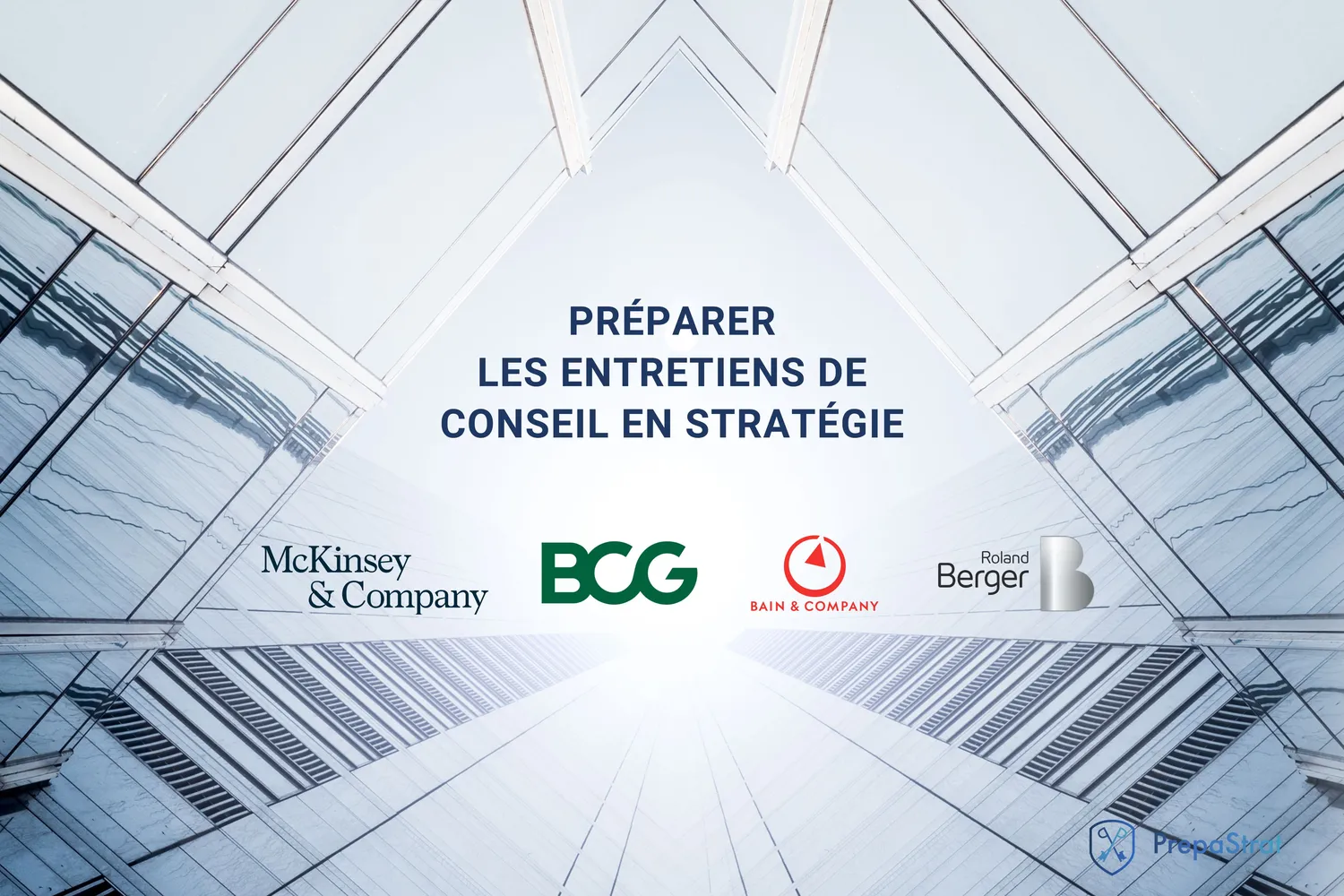
Preparing the fit part of strategy consulting interviews
What is a fit in strategy consulting?
The fit part of strategy consulting interviews is the most important, but few candidates know it. Without a good fit, you won't get through to the next round, whereas an excellent fit will get you an offer.
The fit generally takes place at the beginning of the interview and lasts 15 minutes. It is broken down into two parts, first your introductory pitch and then your answers to the interviewer's questions. We can also include a 5-minute Q&A at the end of the interview. The fit part should enable the interviewers to answer three fundamental questions:
- Skills: Is this person right for strategy consulting?
- Motivation: Is this person right for my practice?
- Personality: And finally, do I want to work with this person?
The fit part goes by very quickly in an interview, and you won't have much time to convince your interviewer. So, the fit requires a great deal of preparation if you are to succeed. We recommend that you prepare in two stages: theoretical preparation, which consists in creating the grey matter you're going to use, and practical preparation, which consists in practicing.
Read also: Everything you need to know about strategy consultants: assignments, careers, salaries
Theoretical fit preparation
Many candidates prepare and work on their fit at the end of their interview preparation, just before starting the recruitment processes at the firms. In our opinion, this is the wrong strategy. On the contrary, you should prepare it first, not least because this preparation will enable you to build up your CV and cover letter, which are the two elements requested by all recruitment agencies.
The so-called theoretical preparation of the fit consists of preparing all the elements you'll need to answer the interviewer's various questions. First, go back over all your experiences and write down your life story. Then, prepare your answers to the three basic questions.
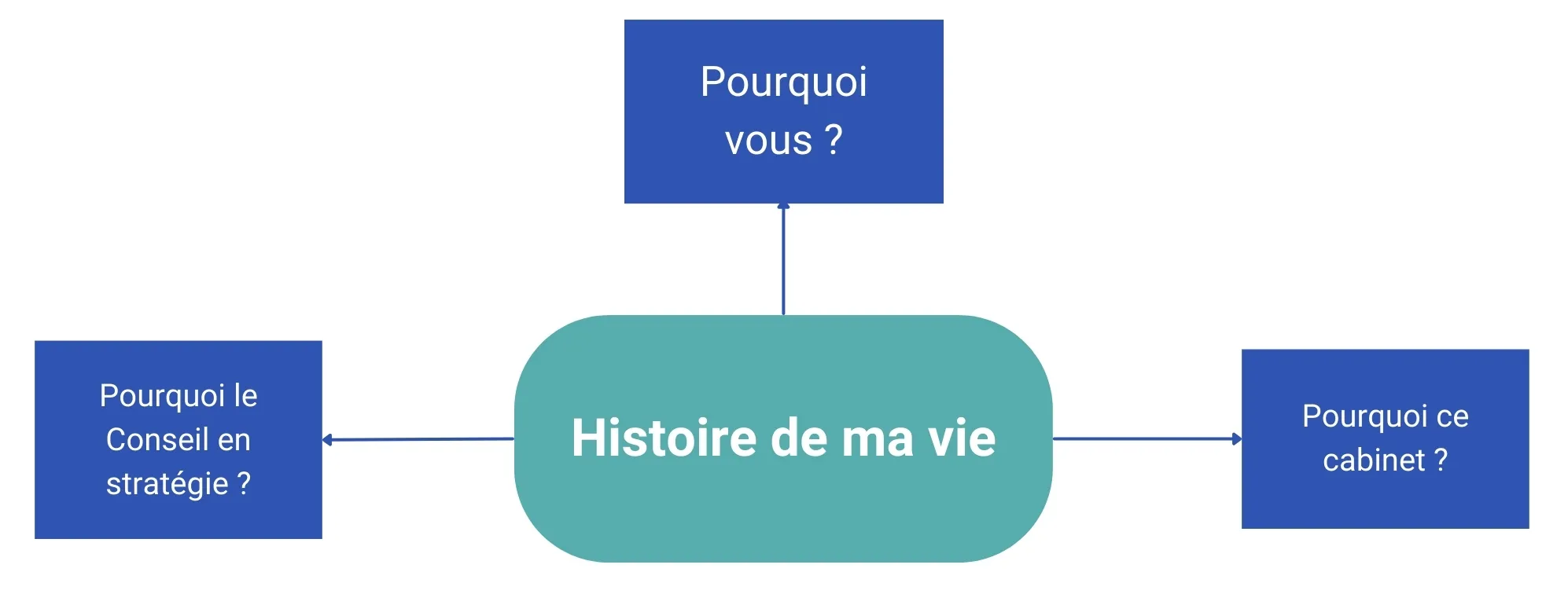
1. Write your life story
- One of the most effective approaches to preparing your fit is to draw up a detailed chronology of your life. You should list all your professional, personal and academic experiences. For each experience, think about several aspects:
- What you've done
- The reasons that led you to make these decisions
- Outstanding experiences, highlighting powerful anecdotes and challenges overcome
- What each experience has given you, both personally (development of qualities and skills) and on a human level (encounters and social intelligence).
2. Prepare your answers to the three fundamental questions
- Introduce yourself? The answer to this question is none other than your introductory pitch. The aim of the pitch is to quickly understand who you are and what you're doing here. What you're doing here means why you've applied for a position as a strategy consultant with this firm.
- Start by introducing yourself in a factual way, with your first name, age, school and program.
- Then, going back over your life story, choose the experiences that best explain why you're applying to this firm as a strategy consultant today.
- Make several versions and test them. Your pitch won't be created in a day, and it's normal to come back to it several times.
- By the end of the pitch, your interviewer should be convinced that strategy consulting, and working for his or her own firm, is the next logical step in your career.
- The pitch should last a maximum of 2 minutes.
- Why our firm? To answer this question, you need to prepare 2 to 3 different arguments. To be as relevant as possible, the most effective way is to talk to some of the firm's consultants. This will provide you with arguments that you won't find on the Internet in two clicks. In general, you should give both professional and personal motivations:
- Professional motivations are linked to the firm's business: sector expertise, functional expertise, type of assignment, customers, etc. Generally speaking, for this type of argument, you need to link it to one of your past professional or academic experiences.
- More personal motivations are generally linked to your interests, your involvement in associations or simply to subjects that touch you. You can illustrate these arguments with personal, academic and professional experience.
- Why strategy consulting? You should have 2 or 3 arguments based on your past experience. Professional experience is generally the most relevant for this question, but more personal experience also works. The most important thing is for your arguments to be specific, not general.
Fit training: putting it into practice
Now that you have all the elements you need to succeed in your fit, the second part of the preparation is training. As with the case studies, you'll get really good at it through practice. The advantage is that you can practice alone, in pairs or with others.
To begin with, you can practice on your own by recording yourself. This exercise is very useful for correcting the form of your speech and paying attention to the length of your answers. Again, for both your pitch and your answers, limit yourself to 2 minutes speaking time. It's better to have short, concise answers on which your interviewer will challenge you by going into greater depth on certain points, than long answers that will lose everyone.
Then practice in pairs and/or with several people. There are several ways to do this:
- Before each case study: you agree with your partner to make your pitch and answer one or two questions.
- By doing 100% fit sessions: you take 20 to 30 minutes with a pair or several people to test your pitch and answer questions.
The idea is to approach fit preparation in the same way as case study preparation, with in-depth work and practice through regular training sessions.
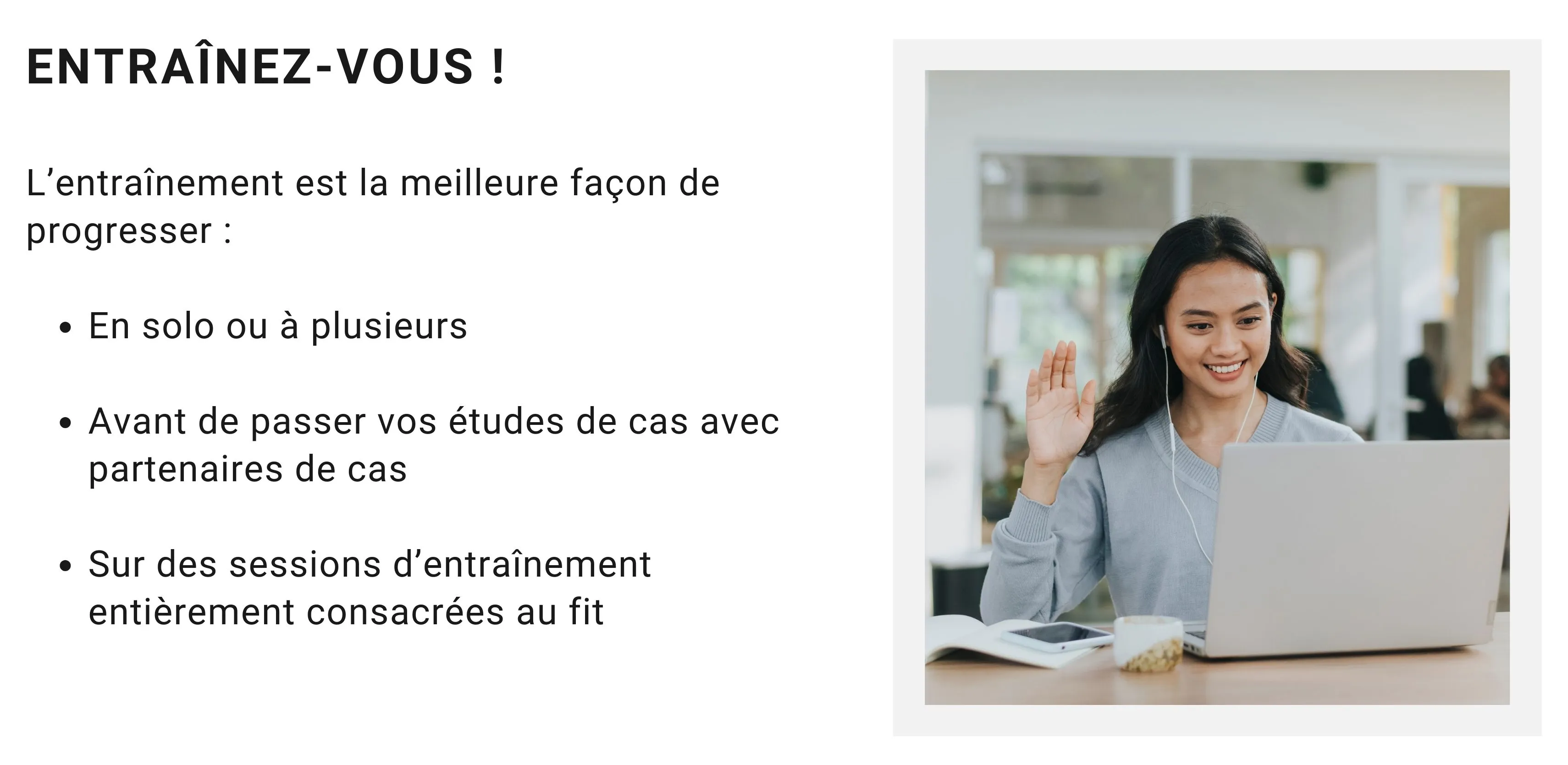
Preparing the case study part of strategy consulting interviews?
What is a case study?
The case study is the test dreaded by all candidates, and the one they prepare best for, because you have no choice. It's an exercise generally based on a real strategy consulting assignment on which your interviewer, or at least the firm, has already worked. You will be presented with a business problem facing a company or organization.
In 30 to 45 minutes, you'll have to put yourself in the shoes of a consultant and come up with a solution. Your role will be to give a structured response, analytically justified, and leading to recommendations for improving the initial situation, which you will set out at the end of the case in a concise, punchy summary.
As with the fit, preparation for the case studies takes place in two stages. Theoretical preparation, to learn how to master the different aspects of the exercise, and practical preparation, where you train in real-life conditions with partners.
Read also: 10 things you need to know before applying for a job in Strategy Consulting
Theoretical preparation of case studies
Before plunging into case study practice, you need to prepare all the elements you'll need to succeed.
1. Mastering case study methodology
- To adopt the right methodology, it's vital to understand how a case study works, and to master the process from start to finish, building reflexes that will serve you well at every stage. It's also important to remember that a case study is an interactive discussion between you and your interviewer.
- At the start of the case, use clarification questions: Make a list of questions you'll ask to help you better understand the case study. For example, at PrépaStrat we use the ROLS method (Summary, Objectives, Location, Strategy) to clarify the terms of the subject, and the PCD method (Products, Customers, Distributions) to better understand the business model.
- During the case : Structure your approach each time step-by-step with (1) a description of what you're going to do, (2) your analysis, (3) an intermediate conclusion with results, (4) the so-what, (5) next steps.
- At the end of the case : Use a structure for your conclusion that you'll do every time to end your case study.
2. Master the frameworks of the various case studies
- Once you've understood how a case study works, it's time to create your frameworks for each type of case. This is an important and decisive stage in your preparation.
- Start with existing frameworks that you can easily find in your school's network or via our preparation platform, PrépaStrat.
- Make your frameworks your own by working on them. It's essential that you customize them to get the most out of them.
- Memorize your frameworks to master the basics and then be able to detach yourself from them as you train.
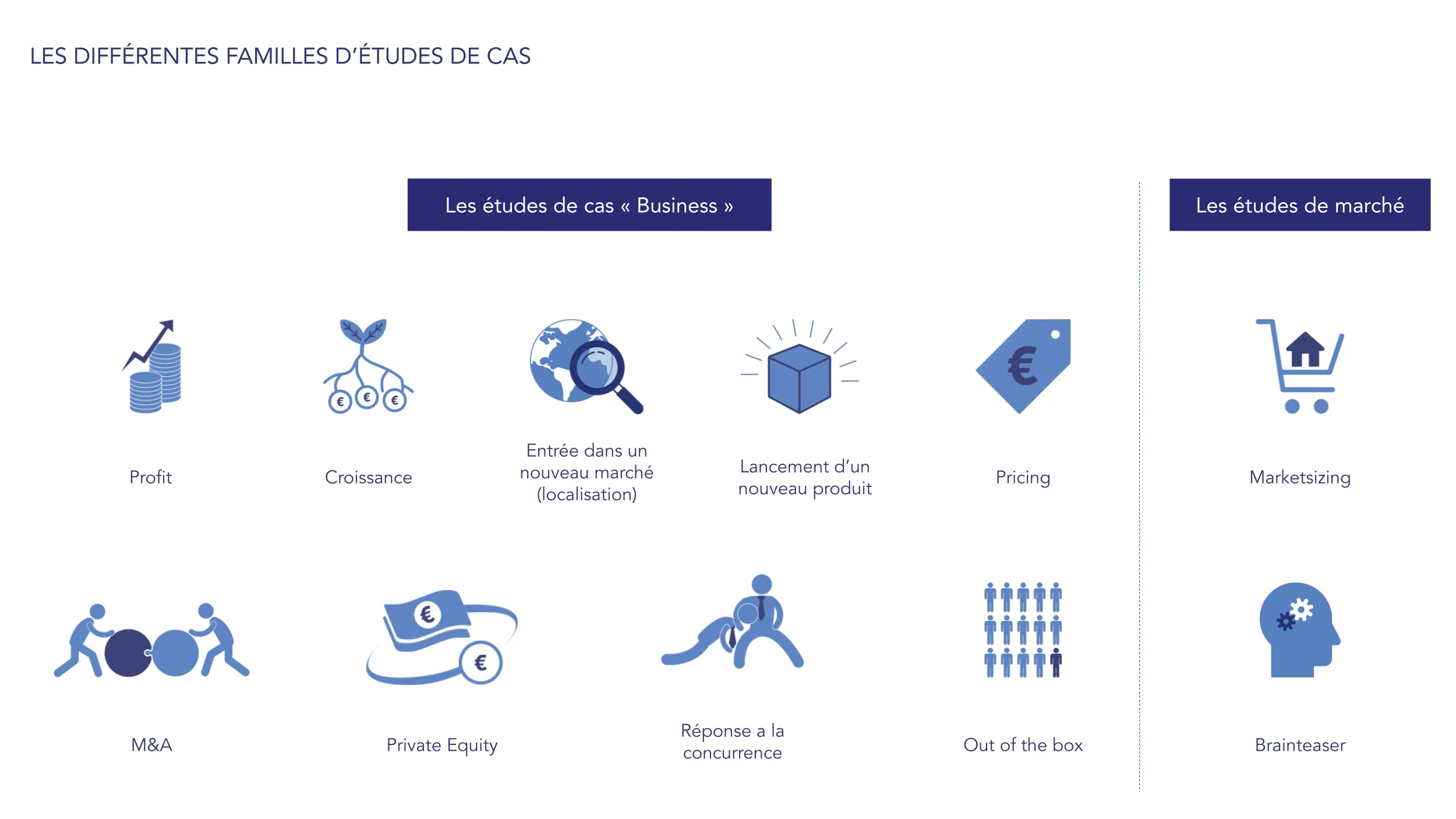
3. Prepare your toolbox
- The frameworks are the basics you need to know before embarking on case studies, but there are also plenty of other interesting elements to keep in mind, which you can incorporate into a "toolbox". You can build it on cards, Excel or Powerpoint.
- General business principles: increase revenues, reduce costs, analyze a market, analyze a company, analyze a merger-acquisition, etc.
- Key data to know, especially for market-sizing: economic, demographic, geographic, sectoral, etc.
- Main financial and mathematical rules: valuation, growth calculation, profitability, %, calculation rules, etc.
- Sheets and sector-specific information if you want to go even further to master different subjects you may not be familiar with.
These 3 elements are the pillars of your theoretical preparation for mastering the case study exercise. Note that your methodology, frameworks and toolbox will evolve as you train and progress in your preparation.
See also : Ranking of strategy consulting firms
Training with case partners
The second stage in your preparation for case studies is practical training. For the fit, it's relatively straightforward to put into practice, since you'll more easily master what you can directly relate to. But when it comes to case studies, you've got to take the plunge!
How do you do it? Conduct case studies with a partner, putting yourself in real-life interview conditions. Your partner should evaluate you on both the content and form of the case study. For subjects, you can use case studies that have already been used in interviews.
With whom? In the beginning, you can start with 2 or 3 partners to build up your power quickly and keep training. Then, we advise you to diversify the type of partners you choose, especially with profiles different from your own: engineers if you go to business school, foreigners if you only train with French people. Last but not least, if you're lucky enough to be able to train with consultants in your firm, make the most of it! They're in the best position to give you the feedback you need to make rapid progress.
Which language? In the Paris offices, the vast majority of interviews are conducted in French, with an average of one interview in English in each recruitment process. However, when interviews are in French, there is often a question or conclusion in English. So we recommend that you do 80% of your case studies in French, with a question or conclusion in English each time. And the remaining 20%, just do them in English.
How often? Start by doing a case study every day or two for the first few weeks of your preparation. You'll see that in the beginning, the margin for progress is exponential! After 15-20 case studies, you'll feel very comfortable. Be careful, however, not to burn out: case studies are tiring. That's why it's not advisable to do more than 2 a day, bearing in mind that you need to take the time to correct them.
How long? As we were saying, you don't want to burn out. A case study takes you 30 to 45 minutes to complete. Then it takes you the same amount of time to get your partner through. So, you're looking at about 1h30. Then you have to correct and rework the case study, which is the hardest and most important part of the job. This will take you around 1h to 1h30. So, on average, completing a case study takes 3 hours of your time, which is why it's important to plan ahead to avoid overloading yourself and ending up in a rush.
How many case studies? There are no rules, but the vast majority of candidates will go through more than 20 case studies. After 20 case studies, you'll probably feel comfortable with the exercise, but perhaps not yet completely ready. Keep practicing. When you start interviewing for real, slow down in your practice. You can keep going, but you don't have to burn out.
The secret of success is to rework these case studies. One of the main mistakes made by candidates is to follow on from one case study to the next without reworking them. A case study needs to be corrected and studied in depth to understand what was done well and what was not done so well. To do this, make a detailed written correction of your case study in a Word document. Then transfer the key information to two Excel files:
- An Excel file for tracking your case studies: note the type of case study, the case sector, your interviewer, your performance (good, average, bad), the positive and negative elements, and the next steps for improvement. This way, you'll have an overview of your progress and your training will be much more effective. It will also enable you to balance the type of case studies you train on.
- An Excel toolbox file: make a note of all the elements that can help you make progress, and the tips you discover about structures, sectors, market-sizing, etc. This file will enable you to keep track of certain tricks and information that can make all the difference on interview day. This file will enable you to keep track of certain tips and information that could make all the difference on interview day.
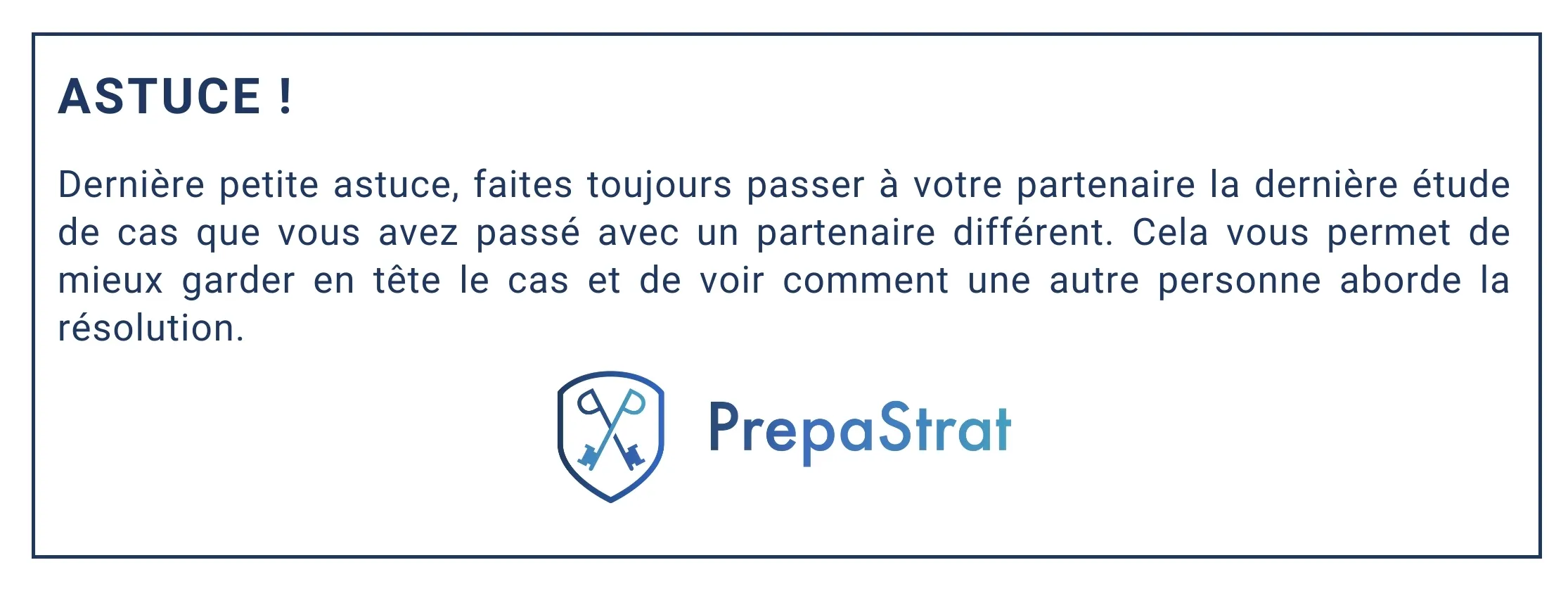
See also: Passing the strategic consulting case study test
To sum up, 50% personal work, 50% practice
So yes, training and practicing case studies and fit is the best way to prepare for strategy consulting interviews. But that's only 50% of the job. The rest is up to you. So prepare the fit and the case studies in advance. Then, as you practice, update your knowledge, challenge yourself and deepen your expertise on each subject. In this way, you'll become unrivalled and succeed in your interviews. But be sure to take a step back from your preparation. Remember, this is a marathon, not a race, so don't burn out and go at your own pace.
Want to boost your preparation for strategy consulting interviews?
Then join us and be part of the 90% of our candidates who integrate a TOP 6 every year. PrepaStrat is the first interview preparation program for strategy consulting firms, with :
- 7 years of expertise, we're the oldest player in strategy consulting interview preparation
- 6 bootcamps per year, comprising 35 hours of training over 5 days
- 1 referent coach from an MBB for each supported candidate
- 100% of our coaches are Senior Consultants and Managers from McKinsey, BCG and Bain
- 10 hours of online training to prepare you for interviews and understand what strategy consulting is all about
- 50+ corrected case studies that have already been published by top strategy consulting firms
- Aim for excellence and join the top strategy consulting firms with Prépa Strat
Discover our bootcampour real-life interviews and our e-learning platform !